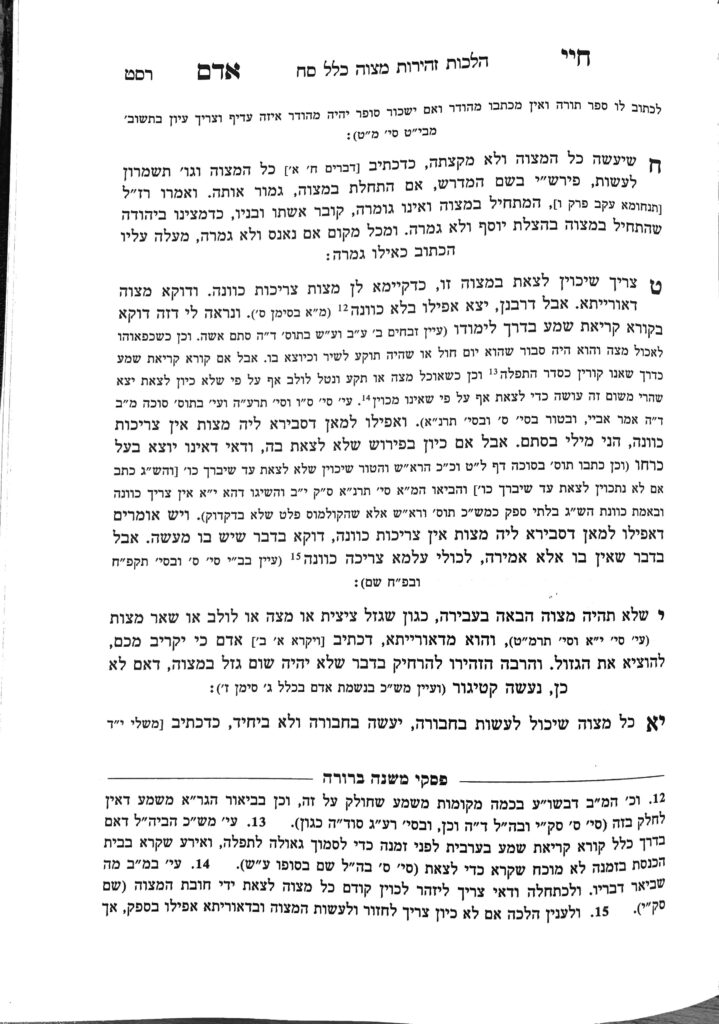We are continuing in siman 9, which discusses the concept of mitzvos tzrichos kavana. Today, we will discuss an interesting application of this concept.
One of the primary discussions about mitzvos tzrichos kavana is in Rosh Hashanah, daf 28-29. The Gemara implies that the concept of shomeah (listener) and mashmiah (speaker), where one person is being motzi others with speech or sound, requires that both the shomeah and mashmiah have kavana to transfer the dibur or sound to the other. This is a tnai in shomeah k’oneh; it only works if both individuals involved have kavana to transfer to each other. And the gemara connects this (according to most rishonim) to the idea of mitzvos tzrichos kavana. (Although the Rashba brings a possible alternative understanding, mitzvos tzrichos kavana is the accepted understanding of the Ran.) In siman 213 and 276, the Beis Yosef paskens that both the shomeah and mashmiah must have kavana to be motzi one another, and says that this is due to the concept of mitzvos tzrichos kavana. Thus, the Beis Yosef understands that this idea is directly tied to mitzvos tzrichos kavana.
The Shulchan Aruch Harav makes an interesting extension. We pasken that counting sefiras haomer nowadays is a mitzvah derabanan. (Tosfos in Menachos says that in order for the sefira to be deoraysa, it must be accompanied by the korban omer, so when we do not have the korban omer, the mitzvah of sefiras haomer is derabanan.) We learned (shiur 1415) that the Magen Avraham paskened that mitzvos derabanan do not require kavana bedieved. If so, shomeah k’oneh should work even without kavana as well.
However, if shomeah k’oneh can work even without kavana, once the tzibbur in shul hears the chazan recite the night’s sefira, they will be yotzei through shomeah k’oneh and they should not be able to recite it themselves.
We learned (shiur 1417) that one can have explicit kavana not to be yotzei. The Shulchan Aruch Harav suggests that one must therefore have such a kavana while hearing the chazan recite the night’s sefira in order to count themselves afterwards.
Other poskim suggest that since it is standard that everyone counts for themselves after the chazan has counted, there is an assumed explicit kavana that one does not wish to be yotzei with the chazan.
The above discussion assumes that mitzvos tzrichos kavana does not apply to mitzvos derabanan, and one does not need kavana to be yotzei, and by extension shomeah k’oneh will work without kavana as well. However, the Gra flips the sugya around. When making a bracha on behalf of another (i.e., shomeah k’oneh), the Shulchan Aruch writes that both the speaker and listener must have kavana to transfer the dibbur to be yotzei. The Gra points out that all brachos are derabanan (besides for birchas hatorah and birchas hamazon). According to the Magen Avraham that one is yotzei a mitzvah derabanan even without kavana, why would the Shulchan Aruch hold that the shomeah k’oneh requires kavana? The Gra concludes that the Shulchan Aruch must hold that mitzvos tzrichos kavana also applies to mitzvos derabanan.
The Gra points out that this same point can be seen regarding Friday Night kiddush. The Magen Avraham himself holds that kiddush on Friday Night is derabanan, because he holds that one is yotzei their chiyuv kiddush deoraysa through davening. Nevertheless, the Shulchan Aruch writes that both the speaker and listener must have kavana to be yotzei. The Gra concludes that either the Magen Avraham is wrong regarding kiddush, and it is a chiyuv deoraysa, or he is wrong regarding mitzvos tzrichos kavana by a mitzvah derabanan, and really mitzvos derabanan require kavana.
Rav Akiva Eiger makes the same point as the Gra, but asks it as a question on the Magen Avraham. He asks that if the Magen Avraham holds that one is yotzei a mitzvah derabanan without kavana, why does the Shulchan Aruch write that one needs kavana for kiddush or brachos?
We see that the need to have kavana in cases of shomeah k’oneh is predicated on the question of mitzvos tzrichos kavana, and the conclusion of the Shulchan Aruch, Gra and Rav Akiva Eiger is that mitzvos tzrichos kavana regardless of whether they are a mitzvah deoraysa or derabanan.
Summary
Shomea money requires kavana on the part of the shomea and mashmia to transfer their speech from one to the other. This is based on mitzvos tzrichos kavana.
According to the Shulchan Aruch Harav and Magen Avrahahm, mitzvos tzrichos kavana does not apply to mitzvos derabanan. If so, in a situation in which one does not want to be yotzei a mitzvah derabanan (such as the chazan’s counting of sefira), lechatchilla one should have explicit kavana not to be yotzei.
According to the Shulchan Aruch, Gra and Rav Akiva Eiger, mitzvos tzrichos kavana applies even to mitzvos derabanan.



